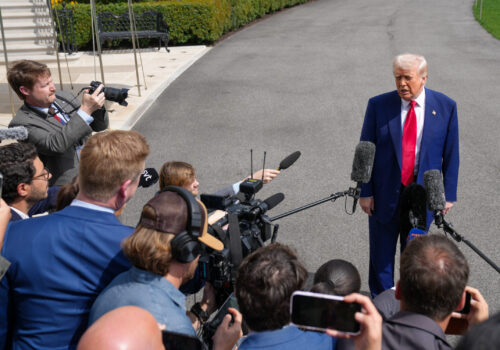Last month, the US House of Representatives narrowly passed a sweeping tax and spending bill that is the top legislative priority for President Donald Trump. Among its lesser-known provisions is a proposed 3.5 percent tax on remittances sent by anyone who is not a US citizen or national.
Currently, remittances are not taxed separately, as senders already pay income tax on the earnings they transfer to family and friends abroad. “The One, Big, Beautiful Bill” would upend that system—effectively taxing those transfers twice. But that’s not all. A tax on remittances—valued at $905 billion globally—would not only hit US households and low-income countries, where they can account for more than 30 percent of gross domestic product; it could also undermine key US national security and foreign policy priorities.
If the Senate passes the Republican budget bill, remittance senders and recipients—who already contend with high fees—will undoubtedly be hit the hardest. In 2024, the global average cost of sending two hundred dollars across borders was 6.4 percent. That’s more than double the United Nations’ sustainable development goal of 3 percent and exceeds the Group of Twenty (G20) target of 5 percent.
If overall remittance volumes were to fall, US remittance providers—the companies that enable the sending and receiving of these payments—would be adversely affected. The proposed legislation imposes new responsibilities for these remittance service companies—such as verifying the sender’s citizenship and enforcing new fee structures and reporting mechanisms—all of which impose new costs, compliance burdens, and risks for remittance providers. These additional requirements threaten to reduce operational efficiency and drive up consumer prices, especially as US companies currently dominate the remittance services sector, setting standards for transfer speed, cost, and security. A tax-driven shift in the market would hurt these companies’ profitability and competitiveness, undermining broader US economic interests.
The risk of driving transactions underground
When it comes to national security, the United States already has a robust framework to monitor and regulate money and payment flows, including laws and infrastructure designed to combat financial crime. Remittance service companies are a central component of this framework, enabling state and federal law enforcement to track and pursue suspicious transfers and bad actors.
Moreover, research shows that taxing remittances leads to increased use of underground or informal channels for sending money. That is, senders seek out alternatives—less regulated, less transparent, and less safe ways of transferring their money abroad. In fact, countries that have enacted punitive measures on cross-border payments and currency exchange have often undermined their own ability to combat financial crime, thereby weakening their economies and diminishing their foreign influence.
Argentina serves as a revealing case study. Under previous leadership, the Argentine government imposed foreign exchange and capital controls that drove transactions into underground banking networks, making it far harder to trace illicit activity. These restrictions also weakened the already vulnerable economy, contributing to stagnation and inflation. President Javier Milei is now actively reversing these policies in favor of open and transparent capital flows and foreign currency exchange—reforms that significantly benefit both law enforcement and economic stability.
In the United States, the revenue generated by a federal tax on remittances would likely be less than 0.1 percent of the national budget. At the same time, it would reduce remittance volumes or push them underground, contradicting broader US national security goals and making US companies less competitive by increasing their cost of doing business. Accordingly, policymakers should reconsider the trade-offs and recognize that transparent, reliable remittance services serve the national interest of the United States.
A foreign policy tool hiding in plain sight
With respect to foreign policy and the ability to influence global development, remittances play a vital role—especially in an era of shrinking public-sector aid. Private remittance flows often reach communities and individuals more directly and efficiently than government-to-government assistance. US senders are often family members and friends of recipients, as well as faith-based and other humanitarian organizations. These flows ultimately contribute to stabilizing fragile economies, reducing the financial distress that often drives illegal migration. Additionally, remittances often support democratic activity and institutions in recipient countries, while also helping undermine autocratic governments by empowering citizens with resources independent of state control.
Because they account for one-sixth of all cross-border payments, remittances also reinforce the global dominance of the US dollar. A large portion of remittances is sent in—or exchanged into—US dollars, bolstering the currency’s central position in the international financial system and providing visibility into foreign transactions. This visibility, in turn, allows for the effective enforcement of anti–money laundering (AML) and countering the financing of terrorism (CFT) policies, as well as sanctions enforcement in cases of illicit activity.
Given these strategic benefits, the United States should take concrete steps to better leverage remittances as a national security and foreign policy asset. This begins with adopting smart, forward-looking policies that strengthen remittance channels and maximize their impact.
First, US policymakers should not just protect, but also actively promote legal remittance channels to ensure that these funds can flow safely and efficiently. Rather than imposing restrictive measures such as new taxes, the United States should foster deeper collaboration between law enforcement and well-regulated remittance providers. Such cooperation would support the adoption of rapidly evolving compliance technologies that more effectively detect illicit financial flows.
Second, the United States should reduce the costs and friction associated with remittance transactions. This includes granting well-regulated US remittance providers direct access to national payments systems and modernizing AML and Bank Secrecy Act regulations to reflect the realities of digital transactions. Emerging technologies can improve financial crime detection—provided that regulators offer clear guidance and foster their adoption.
Third, the United States should leverage its presidency of the G20 in 2026 to establish a global working group that captures the complexity of remittances as a tool of foreign policy and national security. The G20 has traditionally provided targets for remittance payments. Additionally, a US-led working group could address the need for better global coordination to curb illicit flows, reduce frictions, and explore how remittances can complement official aid flows, especially in constrained fiscal environments.
By recognizing and elevating the role of remittances, US policymakers can incorporate a powerful, underused asset into their broader foreign policy strategy—one that supports both domestic prosperity and global stability.
Ananya Kumar is the deputy director for future of money at the Atlantic Council’s GeoEconomics Center.
The author thanks Daniel Gorfine for his contributions to this article.
Further reading
Tue, May 20, 2025
Why the US cannot afford to lose dollar dominance
Atlantic Council Strategy Paper Series By Martin Mühleisen, Valbona Zeneli
Since World War II, US geopolitical influence has been compounded by the role of the dollar as the world’s dominant currency. As global economic power becomes more diffuse and strategic competitors “dedollarize,” policymakers must determine how to maintain the dollar’s role at the center of global trade and financial networks.
Tue, May 27, 2025
What’s the Trump administration’s dollar strategy? It depends on who you ask.
New Atlanticist By Alisha Chhangani
Within the White House, there appear to be competing and fractured views of the dollar’s role. This dissonance could result in harm to the currency’s long-term dominance.
Thu, May 22, 2025
Gold’s geopolitical comeback: How physical and digital gold can be used to evade US sanctions
New Atlanticist By Kimberly Donovan, Maia Nikoladze
The rise of gold-backed currencies that circumvent the US banking system could create a massive blind spot for US sanctions enforcement efforts.
Image: People walk past a money exchange office in Ciudad Juarez, Mexico October 25, 2024. REUTERS/Jose Luis Gonzalez



